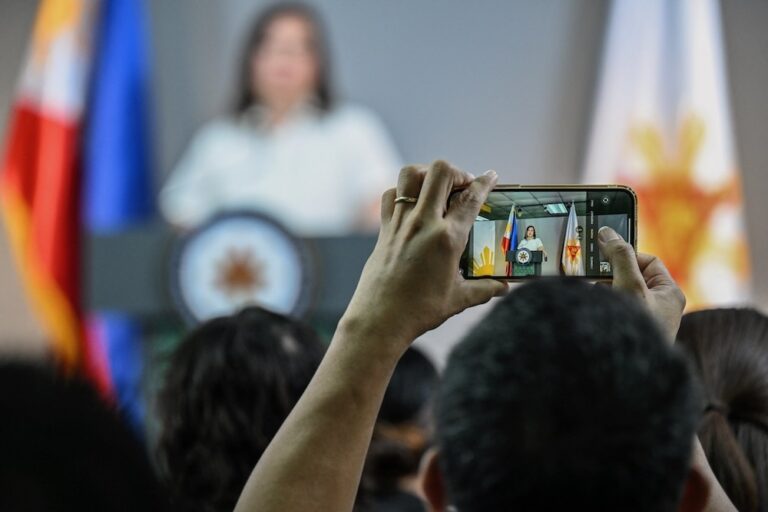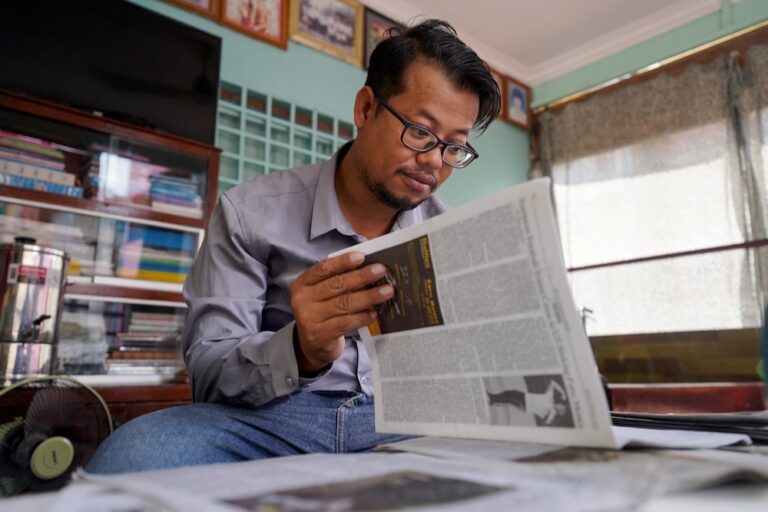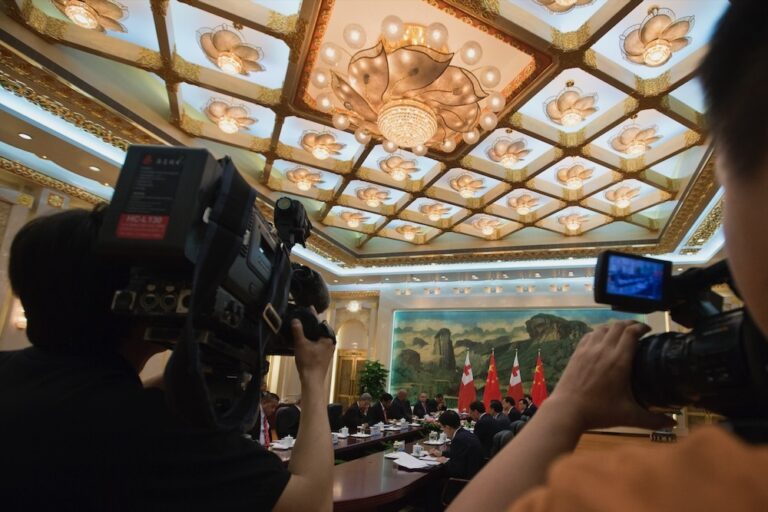February 2024 in Asia-Pacific: A free expression round up produced by IFEX's regional editor Mong Palatino, based on IFEX member reports and news from the region.
Internet shutdowns in Pakistan and India, new security legislation in Hong Kong, media impunity in Indonesia, China Dissent Monitor, and recommendations for the Malaysian Media Council.
Hong Kong introduces new security legislation
Four years after the passage of the Beijing-imposed National Security Legislation (NSL), Hong Kong authorities introduced a domestic version of the law, which could “criminalise people’s peaceful exercises of human rights.”
The NSL covered offences related to terrorism, secession, collusion, and subversion. The new legislation, known as Article 23, expanded the coverage of national security offences by including treason, sedition, state secrets and espionage, sabotage and external interference.
The Hong Kong government first attempted to pass Article 23 in 2003 but it was withdrawn after half a million people joined a protest against the bill. The government revived the bill after two decades and only after the NSL severely eroded the city’s civic space by criminalising the work of democracy activists, opposition forces, and independent media.
During the public consultation period, IFEX member Hong Kong Journalists Association was among the few voices that raised alarm over Article 23.
“The association believes that many offenses are currently defined too broadly, which may result in many cases being prosecuted where there is no real risk or very little risk to national security… causing the severity of charges to far exceed the actual harm of the offenses.” HKJA
They echoed warnings by global civil society groups about the vague offences defined under the bill, and shared as an example how media reports can be misconstrued as collusion with “external forces”: “If a local or foreign media outlet quotes a foreign official’s criticism of the Hong Kong or Chinese governments in a report, it may be accused of smearing or making false statements that are harmful to national security.”
India blocks the internet amid farmers’ protests
The government of India installed barricades and imposed internet shutdowns to preempt protesting farmers from reaching New Delhi.
Thousands of farmers have staged protests demanding higher prices for their goods and an end to local violence. Authorities responded by violently dispersing protest camps and shutting down the internet in rural districts.
IFEX member SFLC.in condemned the internet restrictions and the executive order directing X (Twitter) to block accounts and take down posts that are critical to the government.
“Silencing voices on social media through account suspensions and content takedowns restricts the free exchange of ideas and undermines the right to peaceful assembly. These actions create a chilling effect, discouraging individuals from expressing their opinions and participating in online discourse.” SFLC.in
They urged authorities to conduct a dialogue with protesters instead of using violence and censorship:
“While maintaining public order is crucial, stifling legitimate dissent through digital restrictions is counterproductive. Open dialogue, even when uncomfortable, is essential for a healthy democracy. The government must engage with the farmers’ concerns and address them through constructive conversations, not through censorship.”
Pakistan: Post-election internet disruption, media harassment and gendered attacks
The 8 February election in Pakistan was marred by internet disruption and harassment of journalists in polling places. The post-election uncertainty was exacerbated by recurring online restrictions, and in particular, the blocking of X (Twitter). IFEX member Bytes for All revealed the technical aspects of the blocking of X (Twitter), noting that the “blockage raises concerns about censorship and a set of digital rights violations.”
Several journalists were also attacked on social media by political leaders and their supporters. IFEX member Pakistan Press Foundation (PPF) deplored the online violence directed against members of the media:
“The PPF is alarmed by the intensification of cyberbullying tactics, particularly against female journalists, in the wake of electoral frustrations expressed by political entities. The online platforms, which should serve as spaces for free expression and democratic debate, are marred by harassment and intimidation.” PPF
PPF urged political leaders to resolve disagreements with the media through civil discourse, saying, “We urge all political parties and their leadership to denounce and curb such harassment campaigns against journalists unequivocally. It is imperative that a civil discourse be maintained and any disagreements with journalistic content be addressed respectfully and constructively.”
Related to this, more than 60 women journalists signed a statement drafted by the Network of Women Journalists for Digital Rights, calling out the non-consensual use of images and doctored images created through generative AI that promote misogynistic and gendered insults against women journalists.
New reports and initiatives
Impunity in Indonesia. IFEX member Alliance of Independent Journalists documented 89 cases of attacks against journalists in 2023 in Indonesia. It also pointed out that only two perpetrators have been convicted in court. It warned that the state of impunity could negatively affect the local elections scheduled for November of this year. “Repression may continue to occur because impunity is still strong, there is a trend of intimidation of civil society for criticizing the quality of elections, and an alleged lack of neutrality of the security forces.”
China Dissent Monitor. In China, Freedom House recorded 952 dissent events during the fourth quarter of 2023, which were mostly related to labour and housing issues. In addition, 200 cases of religious dissent were also documented despite the prohibitions imposed by the state.
Preserving Uyghur language and culture. Linguist and writer Abduweli Ayup was awarded by the Linguistic Society of America and the Committee for Endangered Languages and their Preservation, for his efforts in preserving Uyghur language and culture. After fleeing to Turkey in 2015, Ayup arrived in Bergen, Norway in 2019 and took up a two-year residency with IFEX member the International Cities of Refuge Network (ICORN). In an interview with ICORN, Ayup shared that Uyghurs in the diaspora have already established 30 schools promoting their language. He has also written nine textbooks for children and conducted language lectures in Europe and North America. Among his new projects: a summer camp In Istanbul, a series of bedtime stories, and a symposium in Washington.
‘Media Times’ in the Philippines. The 2023 edition of Media Times published by IFEX member the Center for Media Freedom & Responsibility (CMFR) is now available online. It has stories on the state of local media, post-pandemic recovery, and continuing human rights violations. CMFR executive director Melinda Quintos de Jesus underscored the role of the media in remembering all those who were killed by state agents but not named in news reports or official records.
“The press must bear this in mind as we move forward … Media’s short memory helps darkness take over our lives.” Melinda Quintos de Jesus
Cambodia: Training of citizen journalists. A video produced by IFEX member the Cambodian Center for Independent Media featured testimonies of citizen journalists. They shared their experiences about the training they had participated in and how this had proved essential in amplifying underreported stories from their communities and promoting the public’s right to information. CCIM’s network of citizen journalists has expanded over the years and has become a training ground for future journalists and human rights defenders documenting community-based struggles such as land conflicts, local corruption, and environmental destruction.
Recommendations for the Malaysian Media Council
The Malaysian Cabinet has approved the Malaysian Media Council (MMC) Bill – which means it could be tabled in Parliament this year. IFEX member the Centre for Independent Journalism has shared recommendations for ensuring that the proposed MMC will be an “independent multistakeholder mechanism.” They reminded authorities that the body must have a clear mandate, adequate resources, and independence to fulfill its objectives. They also highlighted the need for a “complete reform of the archaic and repressive laws which undermine media freedom” such as the Official Secrets Act and Sedition Act.
Meanwhile, ARTICLE 19’s Senior Malaysia Programme Officer Nalini Elumalai said that the inclusion of a code of conduct for journalists in the MMC Bill should be reconsidered.
“It is not up to the legislation to set up the code of conduct for the media. Instead, the Government must support press self-regulation from the bottom up, rather than a top down or centrally imposed solution.” Nalini Elumalai, ARTICLE 19 Malaysia



